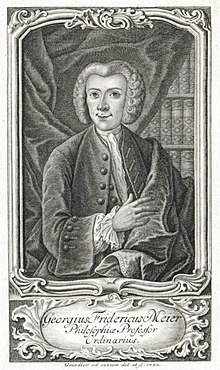fiction.wikisort.org - Writer
Georg Friedrich Meier (26 March 1718 – 21 June 1777) was a German philosopher and aesthetician. A follower of Alexander Gottlieb Baumgarten, he reformed the philosophy of Christian Wolff by introducing elements of John Locke's empiricist theory of knowledge.[2]
Career
Meier studied philosophy and theology at the University of Halle, where he was a pupil of Baumgarten. Meier succeeded Baumgarten as extraordinary professor, and became a full professor at Halle in 1748.[3]
Animal rights
Meier was an early advocate of animal rights. In 1749, Meier authored Versuch eines neuen Lehrgebäudes von den Seelen der Thiere (Attempt of a new teaching structure from the souls of animals) which ascribed the same sensory perceptions to both animals and man.[4] He granted animals imagination, intelligence, judgement, memory, language, pleasure and displeasure. Meier believed that animals were capable of love and that their souls were eternal for God cannot destroy anything.[4]
Meier fiercely opposed the mechanist views of René Descartes.[5] He believed that God had endowed animals with souls to enjoy his creation and after death an animals soul could reach the next step of incarnation until finally becoming a human soul.[5] His doctrine of metempsychosis was not based on respect for animal life or their welfare. In contrast, Meier advocated the killing of animals due to his unusual belief that it would accelerate the rise of their souls.[5]
Works
- Gedancken von Schertzen, Halle 1744.
- Anfangsgründe aller schönen Künste und Wissenschaften, Halle 1748–50 (3 vols.).
- Versuch eines neuen Lehrgebäudes von den Seelen der Thiere, Halle 1749.
- Vernunftlehre, Halle 1752.
- Auszug aus der Vernunftlehre, Halle 1752 (reprinted in Kant's gesammelte Schriften Akademie Ausgabe, XVI, pp. 1–872 with the annotations by Kant).
- Metaphysik, Halle: vol. 1 (1755), vol. 2 (1756), vol. 3 (1757), vol. 4 (1759).
- Versuch einer allgemeinen Auslegungskunst, Halle 1757.
- Philosophische Sittenlehre Halle 1753-1761 (5 vols.).
- Alexander Gottlieb Baumgarten Leben, Halle 1763.
- Beyträge zu der Lehre von den Vorurtheilen, Halle 1766.
- Betrachtungen über die Schranken der menschlichen Erkenntniss', Halle 1775.
References
- Gary Banham, Dennis Schulting, Nigel Hems (eds.), The Continuum Companion to Kant, Continuum, 2012, p. 136.
- Thiel, Udo (2006), "Meier, Georg Friedrich", in Haakonssen, Knud (ed.), The Cambridge History of Eighteenth-Century Philosophy, vol. 2, Cambridge University Press, pp. 1202–3
- "Meier, Georg Friedrich", Encyclopedia of Philosophy online.
- Kuzniar, Alice (2003). "A Higher Language: Novalis on Communion with Animals". The German Quarterly. 76 (4): 426–442. doi:10.2307/3252241. JSTOR 3252241.
- Maehle, Andreas-Holger. Cruelty and Kindness to the 'Brute Creation': Stability and Change in the Ethics of the Man-Animal Relationship, 1600-1850. In Aubrey Manning and James Serpell. (2003). Animals and Human Society: Changing Perspectives. Routledge. p. 89. ISBN 0-415-09155-1
Further reading
- Makkreel, Rudolf, The Confluence of Aesthetics and Hermeneutics in Baumgarten, Meier, and Kant, Journal of Aesthetics and Art Criticism 54(1) (1996): 65–75.
- Riccardo Pozzo, Georg Friedrich Meiers „Vernunftlehre“. Eine historisch-systematische Untersuchung, Stuttgart-Bad Cannstatt 2000. ISBN 3-7728-2023-9
- Günter Schenk, Leben und Werk des halleschen Aufklärers Georg Friedrich Meier, Halle/Saale 1994. ISBN 3-929887-01-0.
External links
 Media related to Georg Friedrich Meier at Wikimedia Commons
Media related to Georg Friedrich Meier at Wikimedia Commons
Другой контент может иметь иную лицензию. Перед использованием материалов сайта WikiSort.org внимательно изучите правила лицензирования конкретных элементов наполнения сайта.
WikiSort.org - проект по пересортировке и дополнению контента Википедии
